 |
This is, in my opinion, one of the
most arresting
views in Britain. We're looking slightly south of west from Cairn
Gorm's
summit, along the line of the "Northern Corries" that form the
mountain's
west ridge. In the immediate foreground is the headwall of the shapely
Coire an t-Sneachda (snow corrie) with the Fiacaill ridge descending to
the right. Beyond that is Coire an Lochain, topped by the summit of
Cairn
Lochain, which some feel should qualify as a seperate mountain in its
own
right. Beyond and to the left are Cairn Toul and Sgor an Lochain Uaine.
Braeriach, Britain's third highest summit, stands directly behind Cairn
Lochain. To the right are the twin summits of Sgor Gaoith and Sgoran
Dub
Mor. |
 |
A telephoto shot of the above
scene, centred
on Coire an t-Sneachda. Sgor an Lochain Uaine (sometimes called the
Angel's
Peak) is almost out of shot to the left; the plateau of Braeriach is
the
prominent top in the right half of the picture, with Cairn Lochan
nearer
to and immediately below it. |
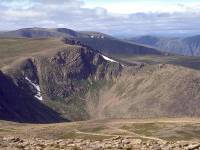 |
The scene adjacent to the one above
(keen
image manipulators might try stitching these together!) We're looking
across
Coire an t-Sneachda to the Fiacaill ridge, with Coire an Lochain
beyond.
Braeriach now appears left of centre, with Sgor Gaoith behind and to
the
right. The Grey Corries range, some 50 miles away, appear behind the
col
to the right of Sgor Gaoith. |
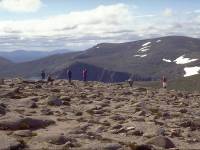 |
Due south from Cairn Gorm, and
we're looking
across the snow-dappled high plateau of the central Cairngorm massif to
the whaleback summit of Beinn Macdui, the second highest mountain in
Britain
at 4295ft. The east top of Stob Coire Sputan Dearg breaks the fall of
the
slope to the left, while the dark conical shape of Carn Etchachan
stands
out below and slightly further left. The prominent mountain on the
skyline
to the left is Carn am Righ. |
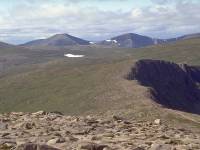 |
Cairn Toul (4236ft) and Sgor an
Lochain Uaine
(4127ft) appear as twin summits in this shot. The so-called Angel's
Peak
was only recently recognised as a seperate mountain, having previously
been regarded as a minor "top" of Cairn Toul. These two peaks are the
fourth
and fifth highest mountains in Britain; Cairn Gorm itself used to be
fifth
highest but is now demoted to sixth following Sgor an Lochain Uaine's
elevation
to Munro status.
The slope falling away to the left
from Coire
an t-Sneachda is Coire Raibert (Robert's Corrie).
|
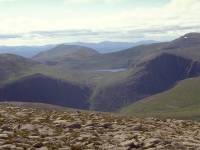
|
Loch Etchachan, in the centre of
shot, is
Britain's highest body of water of any real size. It lies at 3025 ft
above
sea level and is frozen for nearly half the year. Despite appearances
it
drains eastwards (i.e. to the left) rather than northwards (towards the
camera). Stacan Dubha and Carn Etchachan flank it to the left and right
on this side; Stob Coire Sputan Dearg lies behind to the right, while
the
breast-shaped Derry Cairngorm (3789ft) appears 4 miles away to the left.
Loch Avon lies unseen in the trench
in the
foreground, which drops away from the lower reaches of Coire Raibert.
|
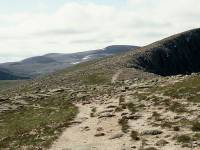
|
The route to Macdui drops initially
down
the pathless summit dome to the southwest then follows this wide path
between
the gentle slopes of Coire Raibert on the left, and the lips of Coire
Cas
and then Coire an t-Sneachda to the right. |
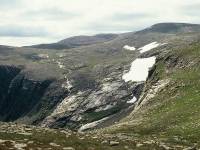
|
The path climbs to the top of Stob
Coire
an t-Sneachda (1176m or 3850ft) and then descends again, still
following
the lip of the corrie. To the left now is Coire Domhain, seen here. The
corrie slopes down to Stag Rocks then falls dramatically to the head of
Loch Avon. Carn Etchachan is on the far side of the corrie, with snow
patches
on its northern slopes. The light rocks below these are the Shelter
Stone
Crags. |
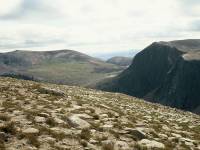
|
From pretty much the same spot, this is
the
view southeastwards with Carn Etchachan on the right and Beinn
Mheadhoin
on the left. The terrain on the slopes of Coire Domhain is very typical
of the Cairngorm plateau as a whole. |
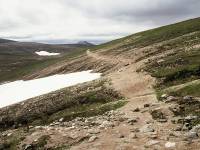
|
The path divides now, with one
branch continuing
to follow the lip of Coire an t-Sneachda up towards Cairn Lochan, and
this
other branch heading off southwest across the plateau. At some
indeterminate
point Coire Domhain becomes Coire Feith Buidhe; Lochan Buidhe, which
the
path skirts immadiately to the west at the col between Cairn Gorm and
Macdui,
is the highest named body of water in Britain at 1120m. It is frozen
for
more than half the year and today it was hidden under a snowdrift. |
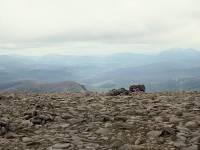
|
The path pushes on for another 2km
beyond
Lochan Buidhe, across stony ground with the slopes of the Lairig Ghru
to
the right and the headwaters of the Avon to the left. The views of
Braeriach,
Sgor an Lochain Uaine and Cairn Toul across the Lairig Ghru are wild
and
dramatic rather than beautiful, while Macdui up ahead appears as a
rather
formless mass. The climb to its summit dome, however, is completely
straightforward.
This is the view SE from the summit,
the second
highest mountain in Britain at 4295ft. We're looking across to the Glas
Maol hills and Glenshee.
|

|
The view southwards from Macdui's
summit,
to the Beinn a Ghlo massif |
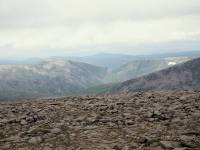
|
South southwest from Macdui; Beinn
Bhrotain
and the great trench of Gleann Geusachan are seen, with the Glen Tilt
Munros
far behind. |
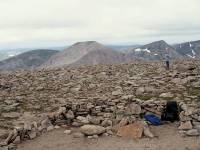
|
Southwest from Macdui, and here
we're looking
across the Lairig Ghru towards Cairn Toul (left of centre) and Sgor an
Lochain Uaine (towards the right). |
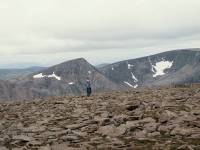
|
The view due west from Macdui's
summit; Sgor
an Lochain Uaine is the shapely peak towards the left, while to the
right
the vast bowl of An Garbh Choire rises to the summit of Braeriach. |
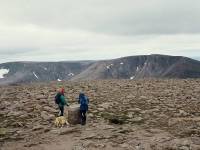
|
Britain's third highest mountain
from its
second highest; Braeriach (4252ft) has a summit plateau equally as vast
as Macdui's. |
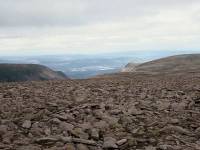
|
The view to the northwest; Aviemore
appears
within the dip formed by the mouth of the Lairig Ghru. |
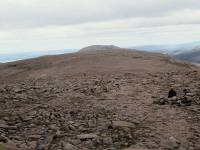
|
Due north from Macdui, acoss the
vast bulk
of the high plateau towards Cairngorm, three miles away. |
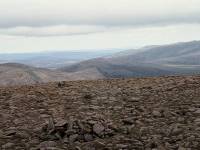
|
Looking eastwards across Coire
Sputan Dearg
towards Derry Cairngorm, with the slopes of Beinn a Bhuiridh some ten
miles
away to the right of the picture. |
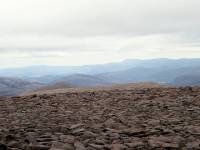
|
The Lochnagar massif seen across
the head
of Glen Dee. |
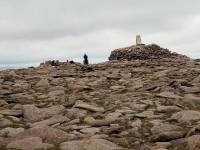
|
The trig pillar, wind shelter and
topograph
on the summit of Beinn Macdui. |

|
With the cloud getting ever lower
it was
time to head back. Cairn Lochan looks a long way away across the
plateau. |

|
Dropping off the summit dome
towards the
dip of Lochan Buidhe, with the dome of Cairngorm beyond. The cloud
began
to drop rapidly after this and I took no more photos that day. The
cloud
had enveloped the summit of Macdui by the time I reached Stob Coire
Cas,
and I contoured around the northwest slopes of Cairngorm to hit the
chairlift
for a rapid descent out of trouble. It was a cold wait for the bus at
the
chairlift base station. |
![]()